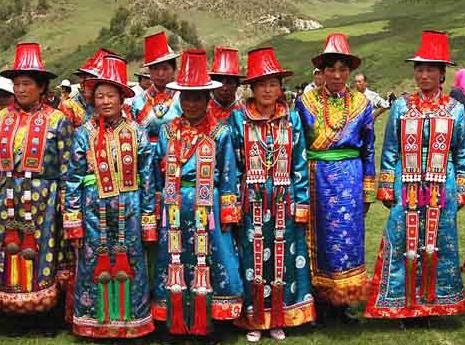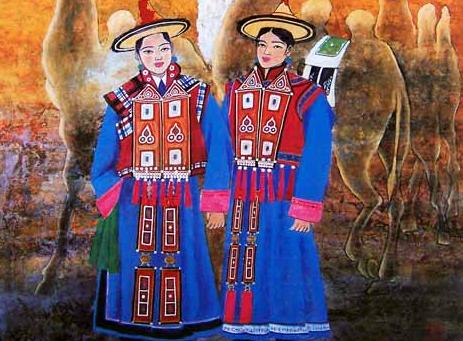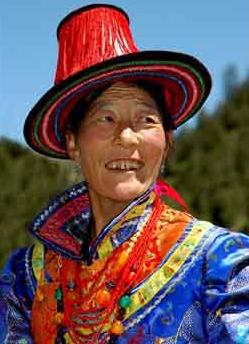
In Chinese, 'Yugur' means 'wealth and solidity'. With a population of 13,719 as at the 2000 census, approximately 90 percent of the Yugur people live in the four areas of Sunan Yugur Autonomous County, and the rest in the Yugur village of Huangnibao area in Jiuquan city (a city in western Gansu Province). The minority has a long history that can be traced back to the year 3 B.C. They live in the mountainous areas, mainly by stock raising, and are typical nomads.
Language and Character:
Three languages are used by the Yugur ethnic minority: the western Yuhur language, a Turkic branch of the Altaic language family (also called Raohul), used by the Yugur people who live in the western part of the Sunan Yugur autonomous county; the eastern Yuhur language, a Mongolian branch of the Altaic language family (also called Engle), used by the Yugur people living in the eastern part of the autonomous county; and the Chinese language.
With regard to written characters, they don't have their own. Chinese characters are widely used amongst all the Yugur people.
Religion:
The Yugur people believe in Lamaism (the Yellow Religion). Other forms of spirit worship are also cherished by them, such as an original belief called the God Khan.
Food and Food Culture:
Only one dinner is eaten every day of which their staple foods are primarily rice, wheat and some mixed grain. As the Yugur people live by stock raising, they usually eat beef, mutton, and pork, as well as chicken and camel meat on which are put some garlic, soy sauce, and vinegar. Due to the special climatic conditions, fresh vegetables are rare, and only some potherbs such as the wild shallot, and leek can be found. Fresh mushrooms are the main vegetables in the fall. In addition, 'milk tea', which is usually mixed with fried noodles, plays a crucial role in the Yugur people's daily life.
The Yugur people are renowned for their hospitality. No matter when guests arrive, they will feast them with great kindness. Fragrant tea or milk tea will be immediately presented that lets each guest feel the Yugur people's friendliness. Singing and dancing performed by the local people will follow accompanied by wines and toasts by every member of the family. When festivals come, each family will bring their best food to treat their honored guests. Among all the delicious food, baked-mutton is the most special.

The Yugur people are deft at weaving and embroidering. They weave beautiful patterns on their carpets, pockets, checkreins and so on. Women are good embroiderers. A variety of patterns are elaborately designed with flowers, insects, grasses, and other pictures embroidered on their collars and sleeves.

Clothes:
The Yugur people have a special way of dressing. Men usually wear high-collared long gowns buttoned on the left, with red or blue waistbands. Women usually wear high-collar gowns overlain with a short waistcoat, and bound with red, purple or green waistbands on which colorful handkerchiefs are tied on the left. They also love to wear a trumpet-shaped red hat, with earrings, bracelets, and rings.
Architecture:
Like other nomadic nations the Yugur people live in tents. Before 1985, the tents were tapered and supported by four, six or nine stakes. However, since 1985, they have adopted the Tibetan-style tents with the square shape sewn by rugs made of goat's wool. Some of the tents are made of white canvas, on which are designed traditional pictures. As the seasons change, the people move their tents to a new place. Usually, a site with a sunny exposure and wind prevention is considered the best.
Marriage Customs:
Grand wedding ceremonies are held in the Yugur minority, which last two days for ordinary people and several days for rich ones. Some customs are quite peculiar. In one the bridegroom shoots three arrows (arrows that will not hurt anyone) to his bride and then breaks the arrows and the bow during the wedding ceremony. According to their culture, this means they will love and live with each other forever. Monogamy is adopted and marriage among people of the same surname and kin is strictly prohibited.
Other Traditions:
Many traditional outstanding cultures are greatly preserved by the Yugur people including legends, folk tales, proverbs, epics, allegories and ballads. In addition, their folk songs expressing their affections are of unique and graceful tunes and are sung by Yugur people of all ages.





